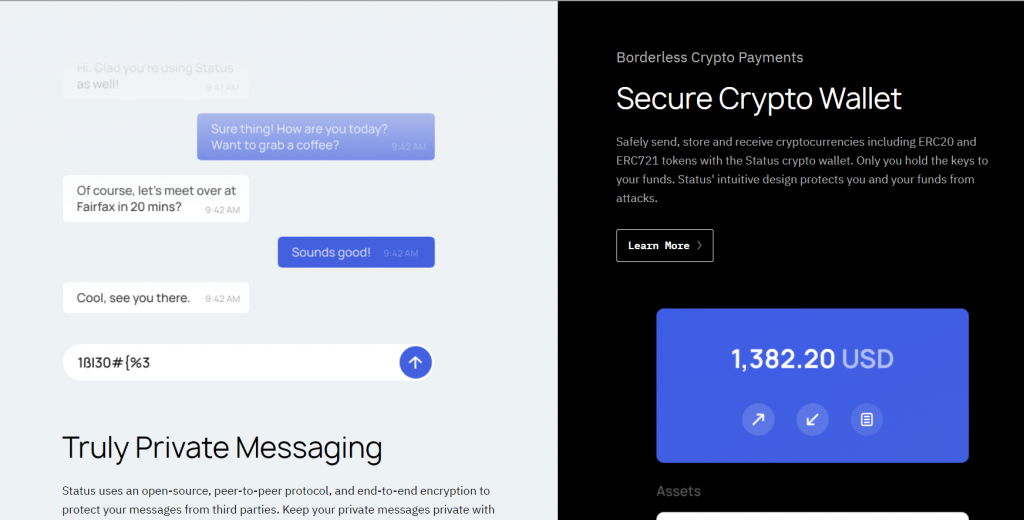Status
(snt)
Not AvailablePrices are in USD.
Market Data For Status
| Current Price | $0.0419 |
| Market Cap | $151,893,040 |
| Market Cap Rank | #349 |
| Total Volume | $3,464,118 |
| High 24H | $0.0384 |
| Low 24H | $0.0362 |
| Price Change 24H | 0.00% |
| Price Change Percentage 24H | 5.75% |
| Market Cap Change 24H | $8,399,622.00 |
| Market Cap Change Percentage 24H | 5.85% |
| Circulating Supply | 3,960,483,840 snt |
| Total Supply | 6,804,870,144 |
| All Time High |
$0.68
-94.41%
January 3, 2018 |
| All Time Low |
$0.0059
March 13, 2020 - |
Coin Data For Status
About Status
Status Review: Mining Guide, Price & Analysis of the Status Cryptocurrency
Status is a blockchain that provides a plethora of services. It provides a messenger, a browser, and a crypto wallet all in one platform. This platform is very appealing. It provides these services in a private manner. Additionally, this blockchain’s cryptocurrency is very accessible. This is because the project runs on the Ethereum blockchain.
We are continuing to see blockchain technology applied to different sectors. This is yet another project steering the world towards a decentralized future. It removes the need for centralized institutions in messaging applications.
Users can be sure that their data is safe and not collected for commercial use. Moreover, there is an economic benefit to this. Status does not involve any fees. Therefore, users save on transaction fees charged by central institutions.
All these features are what make Status successful in the market. Additionally, there are no major competitors to Status. This may lead to it gaining more market dominance.
How Status Works
Status emphasizes the privacy of users and the autonomy of the platform. It has excellent features that allow for private messaging. Status uses the Waku protocol to enable peer to peer communication. This protocol allows the nodes in the network to route messages to the right recipient.
Further, the network encrypts every message relayed on the network. This provides the privacy features on Status. However, Status is not entirely decentralized yet. The network uses mail servers to manage messages when users are offline. The servers deliver the message once the user comes back online.
Additionally, Status has end to end encryption by default. The network generates cryptographic keys when users create an account. It uses these keys to encrypt users’ messages. The network stores the keys locally to ensure maximum security. Moreover, it ensures that users have full control of their keys.
Further, Status provides a secure and privacy-oriented browser to users. All DApps will require permission to access user wallets. Additionally, the Status browser implements the EIP712 protocol. This significantly improves the use of off-chain message signing for on-chain use. On top of that, Status provides a non-custodial wallet to help users store their cryptocurrency.
Status does not require any personal information when signing up. This is unlike traditional centralized messaging applications. They ask for things like phone numbers when you sign up. Such information allows parties to access message transmissions and identify participants.
Can Users Mine On Status?
No, it is not possible to mine on the Status network. This blockchain does not use any particular consensus mechanism. Instead, it depends on the consensus mechanism of the underlying Ethereum blockchain.

This consensus is ideal for providing the network with security. It is one of the safest consensus mechanisms that exist. Miners on the Ethereum network confirm transactions and record them on the public ledger. Here, the records are immutable.
However, this consensus is not perfect. It has some vulnerabilities. It is prone to 51% attacks and double spends. That is why Ethereum 2.0 will launch with the Proof of Stake consensus. Moreover, the PoS consensus does not require high computational power.
The Team behind Status
Status has a great team of developers behind it. The team contains a plethora of experienced developers. The official website provides us with the names of a number of contributors of the network.
However, it does not tell us the experience that these people have. But this is probably to protect the decentralization of the network. Many blockchains opt not to have founders and executives for decentralization purposes.
Moreover, these individuals show a lot of dedication to the evolution of the blockchain. They continue to research ways to improve the network. They show a lot of commitment to the core principles of the network. Therefore, they get the benefit of the doubt.
Further, they continue to abide by censorship-resistant policies. This is very important to users. They want to know that corrupted developers are not a possibility.
Governance
One of the problems with centralized platforms is that users do not have any control on the development process. But that is not the case with Status. Holders of this coin have a say on future development updates.
Holders of this coin can submit development proposals to the community. Then, the community votes on which proposals the developers should implement. The network uses the coins used in this process to clone governance tokens. The amount of governance tokens a user has determines their voting rights.
Further, the developers have in place a Github bounty bot. This allows them to decentralize and incentivize the development process.
Privacy and Security
The emphasis that this network puts on privacy is inspiring. Everything on the network has encryption. This encryption helps maintain a high level of privacy on the platform. There is no worry about censorship attacks.
Additionally, the network allows users to create pseudo-anonymous identities. Users can choose when they want to reveal their identity. In any case, pseudo anonymity is the default setting of Status. Even better, Status does not ask users for any personal information.
Also, browsing on the network is completely private. The browser does not collect any of the user’s data. They have full control of their own data on this system.
Status also has excellent security features. It runs on the Ethereum blockchain. This is one of the safest blockchains that exist. Additionally, it depends on Ethereum’s Proof of Work consensus for security. Proof of Work continues to prove that it is secure and reliable. The only problem is that it is not energy-efficient.
Our Take on Status
Status is a very impressive blockchain project. Users now care about their privacy more than anything. Therefore, they will approve of a platform like this. It allows them to browse, communicate, and transact privately. There is no central institution to collect their data for commercial reasons.
Additionally, this platform is very secure. It runs on the Ethereum blockchain. This is one of the most secure blockchains that exist. This also means that its native coin has great accessibility.
Advantages
- Status is a highly private platform.
- Status is fast and scalable.
- It is very secure and reliable.
Disadvantage
- Status is not fully decentralized yet.
How to Buy and Store Status Coins
If you like what this project has to offer, then you should purchase its cryptocurrency. Luckily, there are several exchanges that support its trading. Some of the best exchanges to use include Bitfinex, Upbit, Binance, and OKEx. The current price of one SNT coin is $0.05070.
Further, you can hold this coin to sell at a later date. It has potential for growth and has great liquidity. You can use the Status in-built wallet to store your coins. It is convenient and very secure.
Final Verdict
This blockchain project is very interesting. It is yet another step towards a decentralized world. There is no central institution to facilitate these services. Moreover, it emphasizes on user privacy and security. As such, everything on the network has encryption on it. There is no central institution to collect user data.
Further, these systems have great potential to grow. It is currently the 89th position in market cap share. Additionally, it has great liquidity. In any case, the Status coin is holding its value in the markets.
 $97,172.00
$97,172.00
 $3,109.04
$3,109.04
 $1,528.07
$1,528.07
 $2,389.10
$2,389.10
 $609.61
$609.61
 $516.49
$516.49
 $294.43
$294.43
 $161.98
$161.98
 $88.85
$88.85
 $157.97
$157.97
 $86.66
$86.66
 $74.47
$74.47
 $76.21
$76.21

